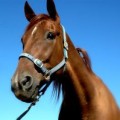They found new ways to herd him around after that, and concentrated on training me. I wasn't going to be able to do what my brother did for the foreseeable future, so I learned to whimper. My instinct was that a sick colt wasn't going to be much good to them, and if I was constantly on the limp they would at least spare me the endless trotting around the house that had driven my older brother to retaliate. It worked for a little while, but I hadn't calculated my sisters' veterinary interests very well. They began to operate on me whenever I pulled up lame, and that was even less fun. I was tied up while they covered my legs and arms with bandages, and I had to stay in my stable until my mother came home, at which time they would tear off the bandages, stuff them back in the cupboard and tell me what awful things they would do to me if I squealed on them.
I suppose that if I were older, I might just have waited for them to grow bored with their sport. But I wasn't very old, and if I had tried to wait them out, I would have waited for a very long time, because my sisters had twice as much time as I had. I might still be under the piano stool. I couldn't fight back like my brother, nor could I appeal to him for help; he treated my plight with studied indifference. Maybe he thought it was better to leave well enough alone. Horses that escape and go wild can be caught and tamed again.
My only hope was to outsmart them, but I wasn't old enough to outsmart the family dog, let alone twins who had me convinced they were everywhere at once. I began to hate horses, refusing to listen when my sisters generously tried to read Black Beauty to me. If I'd known what the word meant I would have known it was propaganda, but I didn't know anything except that I hated them all: white horses, black horses, Trigger, Silver, Champion; each and every horse in the world. They were too big and they had skinny legs, and every time there was a parade they pooped on the streets.
For a while I tried pretending I was a different animal when my sisters pretended I was a horse. I would meow and bark, cluck like a chicken, or moo like a cow. None of it worked. My sisters merely patted my snout and continued brushing my coat, or inspecting my fetlocks, or whatever they were up to. They outlasted everything I tried, even my heartbroken weeping. What saved me from them was the most natural of things in the equine universe: the presence of stallions.
My two horse-loving sisters, somewhere around the age of fourteen, discovered a magic place that was filled with beautiful stallions of every size, breed and colour. The place was the town they'd grown up in. About the same time they discovered the stallions, the stallions discovered them. My sisters began to ignore me, and when they weren't ignoring me they were peering at me as if to say, "You re a human child, aren't you? How boring." My sisters were never ones to do anything half-heartedly. They galloped into the hills where the stallions were waiting for them, and their long dark manes were intertwined with wild violets and the summer wind, and on the wind even I could hear the nervous whinnies of the stallions as my sisters rounded them up.
Horses are dull and stupid beasts, and these stallions were worse than the rest. They were in the back alley at night, behind the house, running through the hedges to brush their huge and hairy snouts against the windows where my sleepless sisters waited for them, waited to stroke their ears, their manes, their heaving flanks. Eventually my sisters went away with the stallions, leaving me with years and years to think about what they were, and what I was, and how, because of them, no one will ever ride me.
Questions for a Written Submission: (1) What is sibling rivalry? Did you ever experience sibling rivalry?
(2) What takes the girls' attention away from their brother? Is this equine distraction a metaphor for something else?

